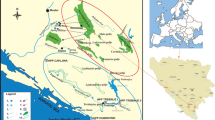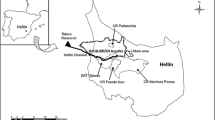Conclusions
-
1.
The content of studies directed at hydrological and water management validation of plans for multipurpose water resource use and conservation has to be established in each specific case, in accordance with river input conditions, the specific water use features in the watershed and prospects for their modification, the specifie functional character of existing ecosystems, etc. Improvement of this important preplanning stage probably requires issuance of methodological recommendations. However, the structure and content of draft plans cannot be strictly regulated.
The difference in approaches to general and basin (regional) plans must be emphasized. On one hand, a general plan can have significantly less detail regarding individual projects but should correlate problems shared between basins and regions. It should include recommendations for more precise siting on the basis of preliminary basin plans.
-
2.
Obligatory requirements for a plan include analysis of changes in river regime and environmental quality under the influence of economic activity in the watershed since compilation of the last plan and analysis of changes in water projects and the efficiency of their utilization.
Particular attention should be paid to validation of programs for cleaning up water sources through use of all available tools and techniques, ranging from legislative and administrative to technical; prophylactic measures should be employed where necessary.
-
3.
The current state of the art requires a wide range of methodological studies, whose results will make it possible to improve the reliability of plans and the conclusions ensuing from them:
-
analysis of sanitary, environmental, and flow-control water releases (in order to move or retain salts and sediment);
-
computation of water/salt balance for rivers in whose basins there is extensive irrigation;
-
establishment of maximum permissible levels of water expropriation from sources and maximum permissible disturbances of river staging;
-
inclusion of the synchronicity (or asynchronicity) of dry and low-water years in water management calculations;
-
calculations for reservoirs whose operation is tied to periodic utilization of subsurface water;
-
estimation of changes in streamflow and river regime for specified changes in climatic conditions;
-
more precise establishment of the characteristics determining water supply guarantees to users of hydroelectric output; compilation of recommendations regarding determination and standardization of these characteristics.
Development of stochastic models of water (demand fluctuation over the long term and in individual years when it depends on hydrometeorological conditions is of great practical importance.
Similar content being viewed by others
Literature cited
A. E. Asarin, “News in water resources planning and current environmental protection requirements,” Theory and Methods in Water Resources Management for Arid Regions [in Russian], Nauka, Moscow (1982).
Planner's Manual for Hydrotechnical Facilities [in Russian], Stroiizdat, Moscow (1983).
S. N. Kritskii and M. F. Menkel', Hydrological Principles of River Flow Management [in Russian], Nauka, Moscow (1981).
S. N. Kritskii and M. F. Menkel', Hydrological Principles of Water Project Management [in Russian], Nauka, Moscow (1982).
V. G. Pryazhinskaya (ed.), Mathematical Modeling in Water Resources Management [in Russian], Nauka, Moscow (1988).
D. Ya. Ratkovich, “The national water supply problem in view of environmental protection requirements,” Vodn. Resur., No. 5 (1985).
A. Sh. Reznikvoskii and M. I. Rubinshtein, Scheduling Rules for Reservoir Regime Management [in Russian], Energoatomizdat, Moscow (1984).
Handbook of Reclamation and Water Management. Vol. 5. Water Management [in Russian], Agropromizdat, Moscow (1988).
Additional information
Translated from Gidrotekhnicheskoe Stroitel'stvo, No. 8, pp. 16–23, August, 1991.
Rights and permissions
About this article
Cite this article
Ratkovich, D.Y. General principles of hydrological and water management analysis for multipurpose water resource utilization and conservation schemes. Hydrotechnical Construction 25, 474–483 (1991). https://doi.org/10.1007/BF01424128
Issue Date:
DOI: https://doi.org/10.1007/BF01424128




